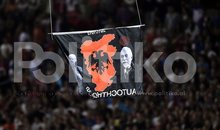
 Flash News
Flash News

By Ekrem Spahiu
The figure of the great Albanian statesman, Ahmet Zogu, shines more and more. The researcher Tanush Frashëri has brought new facts in his work "Italo-Albanian Relations 1910-1939", which, in terms of the archival wealth it brings and the analyzes and evaluations it makes, surely belongs to the unique works both for the subject and for the time to which it is addressed.
By evoking these values and contributions, the very topic that Mr. Frashëri has chosen to research, brings us back a geopolitical assessment that is universally acceptable: Albania's interest in Italy and reciprocally, Italy's interest in Albania, which have been, are and will remain strategic level. Italy, unlike other large and medium-sized powers interested in Albania, is the only power directly neighboring it geographically.

In this context, the author brings us a significant reference from the Minister of Foreign Affairs of Italy at the beginning of the 20th century, Tommaso Tittoni: "The true value of Albania lies in its ports and coast. Their possession either by Italy or Austria-Hungary means superiority in the Adriatic. This Italy would never allow to Austria-Hungary, just as the opposite, Austria-Hungary would never allow to Italy".
Geography has connected Albania with Italy with a strategic security interest. And the real Albanian statesmen of every era could not but consider this interest carefully.
In this context, the relations of the Albanian Kingdom with Italy constitute a chapter that is as complicated as it is intriguing, for which the author enlightens us impartially, through authentic documents.
The author has formulated a fundamental conclusion when he evaluates "King Zog's efforts to break Albania from Italy's suffocating embrace". So, it has separated the equal Italian-Albanian partnership on which the relations between the two countries should be based, from the humiliating aim of fascism.
For this, he brings a lot of archival data and judgments on capital issues of relations between the two countries. Thus, for example, the renewal in 1930 of the 1926 Pact of Friendship and Sobriety.

The Italian side had thought this renewal easy because it prejudiced King Zog as a statesman who "gives in to an Italian pressure against his will or his own interests". Within this bias, the Italian side had thought that the financial threat could be used as pressure to accept the renewal of the Pact and that "the policy of tightening the screws, cutting off aid, that is, suspending the payment of the loan installment... would be leverage of Archimedes who would break the King".
Mbreti Zog pati edhe presione të tjera nga të vetët por, sikurse ka hulumtuar autori, “këto lajme nuk arritën ta tundnin nga qëndrimi i tij i pakthyeshëm”, përkatësisht nga pranimi vetëm i ndryshimeve që e trajtonin Shqipërinë të barabartë në identitet me Italinë, jo vasale të saj.
Autori sjell material të bollshëm arkivor që vërteton se pala italiane ushtroi presion të fortë për bashkim doganor, të cilin Roma përpiqej ta bënte dinakërisht dhe ta paraqiste si nismë të Shqipërisë. Sigurisht që Shqipëria gjithnjë ka patur e do të ketë nevojë për një qarkullim të dëndur mallrash me Italinë. Por evidentohet qartazi se vetë Mbreti këmbëngulte që “qeveria shqiptare dëshiron që ujdia e re të jetë e tillë që të ketë disa rrugëdalje për prodhimet e vendit” dhe se vetëm mbi këto kushte “nuk përjashtohet mundësia e formës së bashkimit doganor”.
Për vetë orintimin e tij gjithëperëndimor, por edhe i ndodhur përpara një presioni të tillë, Ahmet Zogu thirri ekspertizën më të mirë juridike, ekonomike, ushtarake dhe diplomatike të shteteve perëndimore.
Statuti Themeltar, Kodi Civil, Kodi Tregtar, Kodi Penal, Kodi i Procedurës Civile etj, të hartuara nën këtë ekspertizë, shënuan shkëputjen e plotë nga legjislacioni i periudhës osmane dhe e orientuan zhvillimin e Shqipërisë për nga potencialet e veta shtet-ndërtuese.
Në libër gjejmë afirmimin e bollshëm të konceptit të Mbretit Zog për organizimin, përhapjen, arsimimin dhe stërvitjen e ushtrisë. Ai ishte veçanërisht i ndjeshëm ndaj fizionomisë kombëtare të ushtrisë dhe xhandarmërisë.
Nuk mohohet që ushtria kombëtare shqiptare e Mbretërisë gëzoi një mbështetje te Italia për arsimimin e ushtarakëve shqiptarë. Por Mbreti krijoi një kuadër institucional që koncepti i sigurisë dhe mbrojtjes të bazohej në ekspertizën më të mirë nga çdo vend perëndimor. Në ilustrim të këtij koncepti, autori na sjell të dhëna se Mbretëria kishte kërkuar nga qeveria angleze oficerë të lartë të shtatmadhorisë.
Po kështu, u sigurua ekspertizë lidershipi nga Austria, ku spikat përzgjedhja e gjeneral Gustav Mirdaç, në pozicionin më të lartë ushtarak të Shefit këshilltar të Shtabit të Ushtrisë Shqiptare.
Autori ka hulumtuar dokumente të bollshme autentike që lidhen edhe me pushtimin fashist të Shqipërisë. Në këtë kuadër, ai sjell një detaj mjaft interesant, ku referohet se ambasadori italian në Berlin i kishte deklaruar Gjermanisë se Italia “e konsideronte Shqipërinë një problem të familjes, ashtu si Gjermania e sheh Austrinë dhe Çekosllovakinë”. Nga ky libër hulumtues, mësojmë se, në vijim të kësaj deklarate, Tirana ngarkoi përfaqësuesin e akredituar në Berlin, diplomatin e shquar Rauf Fico të hetonte se sa dëm do t’i sillte vendit tonë afrimi italo-gjerman.
Gjithnjë në këtë kuadër, autori vërteton me dokumente se Mbreti Zog po kërkonte alternativa të reja për ekonominë dhe sigurinë kombëtare. Atëherë, Musolini përzgjodhi një politikë afrimi me Shqipërinë përmes ndihmave financiare dhe ekspertizës këshillimore, sidomos në ushtri.
As affirmed by the author's findings, Italy used these to carry out "an increasingly vigorous and useful infiltration", of course in favor of Italian interests to prepare the fascist invasion. Even at this critical point, the author assesses that "From the middle of February 1939, the Italian-Shiptaro relations took a further turn for the worse when the king of the Albanians started playing with open cards".
The author proves with authentic documents that, King Zog's efforts to denounce Italian subversive activity, the Italian side sought to suffocate them through its efforts "to eliminate King Zog", as the main obstacle to the invasion plans.
The book sheds new light on the most reasonable solutions that the Albanian King conceived and implemented for military resistance, for state continuity and for further diplomatic resistance. Mr. Tanush Frashëri's book will constitute a new source of reference for the objective rewriting of history, which Albania still lacks.
Latest news


Not only the body, swimming also helps the brain
2025-07-05 21:02:49
"Be careful with the water", Alimehmeti warns about the health risks of summer
2025-07-05 20:39:10
PSG beats Bayern Munich 2-0, advances to Club World Cup semifinals
2025-07-05 20:19:38

Two vehicles collide on the Elbasan-Peqin axis, drivers injured
2025-07-05 19:26:29

What does Zelenskyy have more than Zegjineja?
2025-07-05 18:45:26

Fiscal peace, but at a cost
2025-07-05 18:00:10
'Bankers' tax evasion, Chinese CEO and former director jailed
2025-07-05 17:39:21
Kyle Walker joins English club on two-year deal
2025-07-05 17:20:24
Two cars collide on the Saranda-Delvina axis, 4 injured
2025-07-05 17:05:29
Touching gesture! Liverpool will pay Jota's family's salary until 2027
2025-07-05 16:45:18
The zodiac signs that cheat most often
2025-07-05 16:25:53

"I asked for the dismissals", Dredha tries to soften Rama's 'blow' in Vlora
2025-07-05 15:48:49
Bomb threat in Parliament, prosecutor: It was a lie
2025-07-05 15:22:28

Bardhi: The recount revealed how greedy Zeqine Balluku is in stealing
2025-07-05 14:44:29
Knife wound on the secondary road Tirana-Durrës, perpetrator sought
2025-07-05 14:37:54
Tears and pain, Diogo Jota is escorted to his final home
2025-07-05 14:21:34
Success starts with yourself! Simple ways to invest in personal development
2025-07-05 13:58:50
Unlicensed firearms found in apartment, 50-year-old arrested in Lushnje
2025-07-05 13:43:11

Tirana Court remands Skerdi Sina to prison
2025-07-05 12:59:34
Cocaine laboratory in Greece, here are the Albanians arrested and wanted
2025-07-05 12:40:16
Directed Justice/Vangjeli: SPAK does not investigate any scandal involving Rama
2025-07-05 12:22:03

Bomb alert, Police remove MPs and media from Kosovo Parliament building
2025-07-05 11:48:16
"The will of the people" and the irony of ordered resignations
2025-07-05 11:32:05
Summer drowning risk: How to enjoy the water without risking your life
2025-07-05 11:20:27
Fire situation in the country, 16 fires reported in 24 hours, 4 still active
2025-07-05 11:07:04
Car hits pedestrian at white lines, injured in serious condition in Vlora
2025-07-05 10:59:58
Mosquito-borne diseases are a growing problem in Europe
2025-07-05 10:44:13



One of Sweden's most dangerous and wanted criminals arrested in Turkey
2025-07-05 09:38:29
Foreign exchange/ How much foreign currencies are bought and sold today
2025-07-05 09:18:38

"Don't be influenced by the opinions of others", today's horoscope
2025-07-05 08:40:50

Morning Post/ In 2 lines: What mattered yesterday in Albania
2025-07-05 08:02:07

Trump says he's ready to raise tariffs to 70% on some countries
2025-07-04 22:35:52
Tre shenjat e zodiakut që do ‘pasurohen’ në Korrik
2025-07-04 22:05:09
Gaza War: Hamas Accepts US Proposal for 60-Day Ceasefire
2025-07-04 21:50:10
Autocracy in Albania, Fuga: Governance has gotten out of control
2025-07-04 21:40:51
Meta: Agriculture on credit, the new fraud!
2025-07-04 21:26:39




Vote recount in Durrës ends without changes
2025-07-04 20:12:54
Gas station explodes in Rome, 25 injured (VIDEO)
2025-07-04 20:00:20

These afternoon habits often sabotage weight loss
2025-07-04 19:39:28
Former Arsenal player Thomas Partey accused of rape
2025-07-04 19:24:21
Shepherd disappears without a trace in Delvina
2025-07-04 19:14:31

Bardho gave Zegjine's mandate/Braho: Unfair! It violates the electoral system
2025-07-04 19:01:08


Rapid developments in the Sultanates!
2025-07-04 18:00:06



Italy tightens rules for skateboard traffic
2025-07-04 17:20:18

Unusual for the time, dense fog covers the coast of Vlora
2025-07-04 16:48:01


Accident on the Shkodra-Lezhë axis, one dead and 3 injured
2025-07-04 16:14:19
Albania with fewer requests for asylum and Albanian citizenship in 2024
2025-07-04 16:06:57

Albania last for quality of life, DP: Technical government is the solution!
2025-07-04 15:42:30
Nico Williams says "No" to Barcelona, signs with Athletic Club until 2035
2025-07-04 15:33:35
Fires in the country, four fires are still active, what is the situation?
2025-07-04 15:24:20

Summer brings big changes for these 4 zodiac signs
2025-07-04 15:00:04
Osmani: MPs need to agree to a secret ballot for the Speaker of Parliament
2025-07-04 14:51:09
Serious accident on the Peqin-Elbasan axis, two injured
2025-07-04 14:37:56

GJKKO leaves in force the security measure for the head of the KPP
2025-07-04 13:58:17
Who will replace Ilir Meta and take over the leadership of the PL?
2025-07-04 13:50:36
Berisha: Dismissal of directors in Vlora, another act of 'scapegoats'
2025-07-04 13:41:46




Librazhd/ In a serious psychological state, the young man consumes pesticides
2025-07-04 13:05:07


Weapons trafficked from Kosovo to Albania, two arrested, 8 pistols seized
2025-07-04 12:33:28
Konsumimi i tepërt i çokollatës, ja cilat janë dëmet që shkakton në organizëm
2025-07-04 12:23:35

Fires in the country, 21 fires in the last 24 hours, 4 still active
2025-07-04 12:00:19
WB calls for debt transparency: Albania to publish details of every loan
2025-07-04 11:50:05
